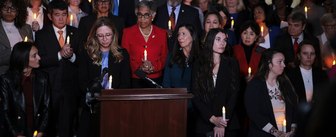In yet another oddity produced by the tumult of 2020, Major League Baseball, which usually opens its season in April, will start in the dog days of summer around the same time the National Hockey League playoffs begin.
Both leagues have implemented rigid new COVID-19 protocols designed to keep players safe. But two in five (40%) of Americans don’t think it’s safe for professional athletes to resume play, according to data from the latest Economist / YouGov survey. About a third (32%) of Americans say it is safe, while about a quarter (28%) say they’re not sure.
The MLB, which regularily releases the number of confirmed cases within the league, will begin its abbreviated 60-game season in late July, making it the first of the major sports leagues to restart play during the pandemic. The survey data shows Americans are split on the notion: 41 percent somewhat or strongly approve of resuming play and 32 percent somewhat or strongly disapprove.
Approval splits along political and racial lines. Around a third of Democrats (32%) somewhat or strongly approve of the idea, compared to the nearly three in five (59%) of Republicans who approve of the restart. Black Americans are less likely to approve (21%) of resuming play, compared to white (45% approve) and Hispanic Americans (43% approve).
What about college athletes?
While the pros are just getting started, some college athletes returned to campus for voluntary training in June, resulting in several schools reporting cases of COVID-19. As of mid-July, the NCAA updated its guidelines and implemented stricter rules. “If there is to be college sports in the fall, we need to get a much better handle on the pandemic,” NCAA president Mark Emmert said in a statement.
Many Americans agree. A quarter (25%) think it’s safe for college athletes to resume play compared to 48 percent who say it’s not safe. Roughly a quarter (27%) aren’t sure.
Half (50%) of Americans approve of eliminating all games and competitions all together for the upcoming fall semester. Full- and part-time students are more likely (56%) to approve such a move.
See the toplines and crosstabs from this week’s Economist/YouGov Poll
Methodology: The most recent Economist survey was conducted by YouGov using a nationally representative sample of 1,500 U.S. adult citizens interviewed online between July 5 - 7, 2020. The approximate margin of error is 3.2 percentage points for the overall sample. Samples are weighted according to gender, age, race, and education based on the American Community Survey, conducted by the US Bureau of the Census, as well as 2016 Presidential vote, registration status, geographic region, and news interest. Respondents were selected from YouGov’s opt-in panel to be representative of all US citizens.
Image: Getty












